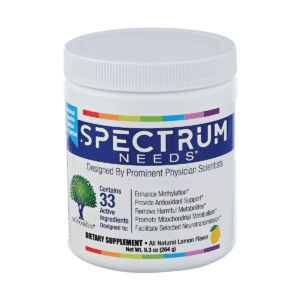$84
VITAMIN C (ALSO KNOWN AS ASCORBIC ACID)
Vitamin C cannot be manufactured by humans and is obtained exclusively from the diet. Vitamin C is a powerful antioxidant, and a key component of the respiratory chain involved in energy metabolism. It also helps the body form and maintain connective tissue, including bones, blood vessels, and skin. Deficiency of vitamin C, termed scurvy, can appear in autistic children with highly restrictive diets. Poor gut absorption, manifested as chronic diarrhea, can intensify vitamin deficiency from a poor diet. Typical symptoms include bleeding (especially of the gums), bruising, rash, slow wound healing, abnormal hair or nails, weakness, fatigue, joint disease, and frequent infections. Although poorly studied, vitamin C is sometimes recommended in ASD to promote energy metabolism and as an antioxidant. In addition, vitamin C is often recommended for a variety of other conditions such as cancer prevention, improve immunity to common “colds”, helping neutralize the effects of nitrites preservatives in some foods, prevent cataracts, and decrease cholesterol levels. At moderate dosing, like that in Spectrum Needs, side effects are rare, however, high dosing can result in side effects, as well as have a pro-oxidant effect.
Vitamin C in Spectrum Needs
 Vitamin C is added in order to provide a wide basis of nutrition, and for its antioxidant properties in ameliorating an underlying defect in redox metabolism or mitochondrial dysfunction.
Vitamin C is added in order to provide a wide basis of nutrition, and for its antioxidant properties in ameliorating an underlying defect in redox metabolism or mitochondrial dysfunction.
Vitamin C (also known as ascorbic acid) cannot be manufactured by humans and is thus a true vitamin, obtained exclusively from the diet.
Vitamin C is a powerful antioxidant, and a key component of the respiratory chain involved in energy metabolism. It also helps the body form and maintain connective tissue, including bones, blood vessels, and skin.
Deficiency of vitamin C, termed scurvy, is often thought of as a disease of the past, but even in rich countries deficiency can appear in autistic children with restrictive diets (https://www.ncbi.nlm.nih.gov/pubmed/26590972) that are low on fresh fruits and vegetables. Typical symptoms include bleeding (especially of the gums), bruising, rash, slow wound healing, abnormal hair or nails, weakness, fatigue, joint disease, and frequent infections.
The role of vitamin C in the treatment of autism is not well studied. Children with ASD often have diets that are relatively deficient in many trace minerals, including vitamin C (https://www.ncbi.nlm.nih.gov/pubmed/28078576; https://www.ncbi.nlm.nih.gov/pubmed/27432261). Poor gut absorption, manifested as chronic diarrhea, can intensify vitamin deficiency from a poor diet. The use of vitamin C in ASD is mostly driven by its antioxidant properties in ameliorating an underlying defect on reactive oxygen species (ROS or redox) metabolism or mitochondrial dysfunction. Several lines of evidence support the notion that some children with ASD have abnormal redox metabolism (this topic is reviewed in https://www.ncbi.nlm.nih.gov/pmc/articles/PMC4910649/pdf/cmped-10-2016-043.pdf), including abnormal glutathione metabolism. Oxidative damage to proteins has been documented in the brain and other tissues in ASD. Redox abnormalities have been linked to mitochondrial dysfunction in children with ASD, and mitochondrial dysfunction is one of the most prevalent metabolic disorders in ASD. Biomarkers suggestive of mitochondrial dysfunction are identified in 30% or more of children with ASD, while about 5% meet strict criteria for a diagnosis of classical mitochondrial disease. In support of this high prevalence of mitochondrial dysfunction in ASD are two studies that found lower than normal electron transport chain function in immune cells from 80% of the children with ASD examined (https://www.ncbi.nlm.nih.gov/pubmed/?term=21119085; https://www.ncbi.nlm.nih.gov/pubmed/?term=24753527). Some of the signs that a given individual with ASD is more likely to have abnormal redox metabolism and/or mitochondrial dysfunction are the presence of chronic pain, increased fatigue on the day following unusual exertion, severe gastrointestinal disease, dysautonomia, or a history of regression (including any loss of abilities, whether transient or persistent). This list is incomplete, and you may want to consult with your physician; laboratory testing can also help.
Vitamin C may help protect against a variety of cancers by combating free radicals, and helping neutralize the effects of nitrites (preservatives found in some packaged foods) that may raise the risk of certain forms of cancer. Supplemental vitamin C may also lessen the duration and symptoms of a common cold, help delay or prevent cataracts, support healthy immune function, and decrease total and LDL (“bad”) cholesterol and triglycerides.
Vitamin C is water-soluble vitamin and thus considered to be generally non-toxic. At moderate dosing, like that in most over-the-counter supplements and in Spectrum Needs, side effects are rare. However, high dosing, over about 1,000 mg a day in adults, may increase the risk for kidney stones, and dosing over 2,000 mg a day in adults may have additional side effects, such as flushing, nausea, headache, and increased blood sugar. Safe dosing in children are correspondingly lower. Vitamin C is often taken as an antioxidant, but high dosing may have a pro-oxidant effect. Thus, moderate dosing is generally recommending for supplementation.
Laboratory testing can reveal the presence of a deficiency of this nutrient, but is generally not likely to have clinically utility.
How and why Vitamin C is used in Spectrum Needs
Order SpectrumNeeds Today
Formulations









